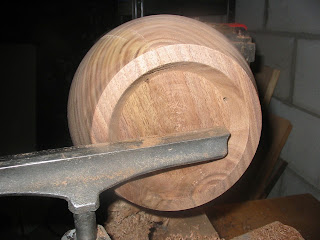Good Morning All,
Well, the temps here in Minnesota have risen over night and everything is beginning to melt, including all of the icicles. The icicles are falling off my roof and they remind of videos of glaciers calving big pieces of ice-you hear a cracking sound, then a big boom when it all hits the ground, and then a shattering sound. Here's a photo of the wreckage:
Amazing.
Ok, back to the bowl
I went out to the shop to take a look at things and to see how the cracking on the side of the bowl was doing and I'm happy, and very relieved to say, that the large cracks that were such a concern are beginning to close. They are shorter in length and narrower in width. The bad news is that since I've begun hollowing the bowl, I'm finding that the cracks extend partly through the thickness of the wood, and one of the cracks goes through the rim. I don't want to throw the bowl away so I'm going to continue to hollow it out and we'll just have to see how the cracking responds.
If you look carefully at this photo you'll see the cracking I'm talking about at about 11 o'clock on the rim of the bowl:
Since I've decided to continue on I'm going to drill down into the bowl with the Forstner bit. I like to do this as it helps to establish the depth of the hollowing, it also removes some of the wood out of the center, and it relieves me the task of doing it manually:
Here is the bowl after about 5 minutes of turning. Notice that the interior of the bowl is cone-shaped at this point and that I've moved the tool rest inside of the bowl:
Here is the bowl about 5 minutes later. Note that the interior is larger and deeper. Up till now I've been using a straight bowl gouge to cut the wood but now since the interior walls are moving outward, I'm going to need to change tools to continue working on the sides.
What is needed now is a tool that will cut on it's side and there are two tools that I have that will do this: on the left of the photo is a large bowl scraper. This is made out of a thick block of steel and can cut on both it's side and it's end. Bowl scrapers are a very nice tool to have as they leave the surface very smooth and can be used on the bottom of the bowl and the sides of the bowl without having to change tools.
The second tool in the photo is a Sorby hollowing tool. Hollowing tools usually are swan-necked and have a cutter that sticks out at an angle from the end. Also the underside of this tool is flattened so it sits securely on the tool rest. This enables turner to insert the tool into the bowl and gently cut the walls so they curve out ward from the center. For this turning today, I'll use both tools:
This photo shows the bowl after I've used the hollowing tool. Note that the tool rest is sitting back from the surface of the wood about 1 1/2 inches. This allows me to move the tool around so I can keep the cutter in contact with the surface of the wood:
In this photo I've used the bowl scraper. Note how the tool rest is now placed right next to the wood. This helps to stabilize the tool as I'm scraping away at the surface:
And here is the bowl at the end of my turning session:
Discussion and Further Plans
There are two considerations here: the cracking on the sides of the bowl and the final interior volume of the bowl itself. As the cracking is responding to the hollowing I'm going to continue to hollow the bowl a little bit everyday and when the cracks disappear, then I'll stop hollowing it out (yes, I know-if I hollow it enough, the whole thing will eventually disappear). Since this bowl is not designed for food volume isn't really a consideration here. I would however like to get the walls and the bottom of the bowl more or less equal in thickness so I'll be turning it quite a bit and very carefully. I'll post again with the hollowing is finished in several days. I'll check on the cracking and take some detailed photos. If all goes well, we'll talk about how to finish the wood.
More later,
VW









No comments:
Post a Comment